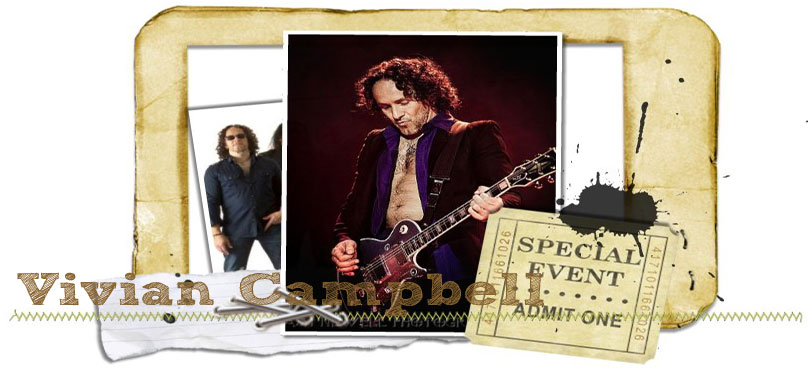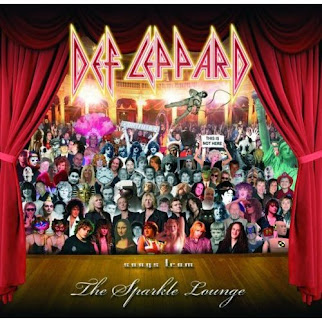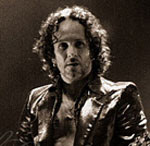Campbell began playing guitar at the age of 12. He has played for Sweet Savage, Dio, Trinity, Whitesnake, Riverdogs and Shadow King.
He also played on Lou Gramm's (from Foreigner) second solo album Long Hard Look. Campbell attended Rathmore Grammar School.
Sweet Savage was a NWOBHM band that Campbell joined when he was 15. The band members in Sweet Savage included Campbell on guitar, Trev Fleming on guitar, David Bates on drums and Ray Haller on bass and vocals. The band influenced Metallica, who covered the song Killing Time on their Garage Inc. covers album. In 1980 when Campbell was 18. In 1981 they released an e.p. consisting of four BBC radio sessions and their first single "Take No Prisoners". "Take No Prisoners" included the song "Killing Time". Much later in the late 90's after Metallica covered "Killing Time", there was interest in Sweet Savage and they released an album without him. Out on tour supporting bands like Thin Lizzy and Motorhead around Britain, Vivian caught the eye of bassist Jimmy Bain, who would soon join Ronnie James Dio to record his post-Black Sabbath solo debut for Warner Bros. In searching for a dynamic, powerhouse guitarist, Jimmy recalled his memorable impression of the young unknown Vivian, and recommended him to Ronnie. Vivian was 19 when he auditioned and that line-up went into the studio to record the now classic Dio albums "Holy Diver" and "Last In Line".
When Campbell joined Dio, Ronnie James Dio had three songs that he had written while Jake was in the band -Stand Up And Shout, Don't Talk To Strangers and Holy Diver. All of these songs appeared on the album and became radio hits. Former Rainbow bassist Jimmy Bainjoined, completing the first line up. The band completed the album, which was a success and included Ronnie's biggest hit to date Rainbow in the Dark. A concert video, called In Concert, from this tour was released. The band also played at The Monsters Of Rock festival in 1984.
For their sophomore effort, 1984's The Last in Line, the band expanded its lineup to include keyboardist Claude Schnell, as the album would become the biggest hit of Dio's career (on the strength of another MTV-approved video, for the album's anthemic title track) and the group became an arena-headliner. Sacred Heart was still a success, and still managed to peak at #29 in the U.S. the album had 2 hits in Rock N Roll Children and Hungry For Heaven. The tour was very successful too and had an over the top stage show featuring a huge Dragon. Also around this time the band recorded the song "Hide In The Rainbow" for the Iron Eagle soundtrack, which was the last song Campbell would record with Dio. A Live EP, called Intermission, was also released. (Craig Goldy played on the albums only studio song "Time to Burn" & over-dubbed the rhythm parts on the live tracks).
Campbell had become disillusioned by the group's direction and split from the group a year later. Just prior to Campbell's exit, the entire Dio band helped organize Hear N' Aid, an all-star assembly of heavy metal artists that recorded a track called "Stars," which helped fight world hunger (a subsequent album was issued as well, collecting previously unreleased live tracks from a few of the day's top hard rock acts).
In 1987, Campbell joined the British heavy metal band Whitesnake. Ex-Thin Lizzy and Tygers of Pan Tang (Spellbound and Crazy Nights albums only) axe-slinger John Sykes played the lead parts on the multi-platinum selling album simply titled Whitesnake, but he was fired by lead singer David Coverdale after the recording of the album, and Campbell replaced him for the subsequent world tour. Campbell was part of the new, glammed-up Whitesnake Coverdale had put together to conquer MTV and American audiences, also including Adrian Vandenberg, formerly of Teaser and Vandenberg, Tommy Aldridge of Ozzy Osbourne and Black Oak Arkansas fame, and Rudy Sarzo, having already become hugely successful playing with Ozzy Osbourne and Quiet Riot. Campbell was fired after the 1987-1988 World Tour, because of "negative attitude".
Vivian yearned to create music that was more blues-based and less hard-rock, and also to try his hand at singing, his undisclosed secret weapon. So the Riverdogs were born, a four-piece outfit with Vivian and cult blues singer Rob Lamothe on lead vocals. This line-up would record one album for Epic Records before Vivian was on the move again. In 1991 during an extended hiatus from touring he would finally begin writing songs for his own debut solo album for Epic Records. Its tone and direction would pay homage the pop-rock sounds of the singer/songwriter movement and the soul and R&B of Motown. Writing collaborations produced beautiful demos and recording of the album was about to commence when the call came from Def Leppard singer Joe Elliott. Always having been a fan of Def Leppard's soaring harmonies and sterling pop hooks, it was a crossroads decision; you only get one chance to join a legendary rock band, and the solo album was put on hold.
In 1992, Campbell joined the rock band Def Leppard, after the release of their Adrenalize album. He replaced Steve Clark, who died on 8 January 1991. According to fellow guitarist Phil Collen, Campbell was able to lock right into the position very naturally by simply being himself. Campbell made his debut with the band by playing a show in a Dublin club to approximately 600 people. A week later, 20 April 1992, the band took the stage at the Freddie Mercury Concert for Life, with their new guitarist. They performed, "Animal," "Let's Get Rocked," and the Queen classic, "Now I'm Here", with Brian May. He has spent the last 17 years with the band.
Thirteen Leppard years later the time finally came to pursue a solo album again, but this time the direction would take a different form. Living in Los Angeles, Vivian had immersed himself in the world of the local blues-club circuit, quite a change from the intricate arrangements, multi-overdubs and state of the art production values of Def Leppard. The spontaneity and "one-take" urgency of the true blues genre dictated a specific new set of rules that would be applied during the making of "Two Sides Of If." Rule number one: it had to be recorded LIVE in the studio, being sure to always maintain eye contact between all of the musicians. This meant Vivian singing lead vocals while playing solo guitar - no overdubs allowed..... Rule number two: have fun and fly by the seat of your pants. With wish-list players like Terry Bozzio on drums, and Billy Gibbons and Joan Osborne making guest appearances, the sessions were inspired and the end result is "Two Sides Of If." Twenty years in the making and not a minute too soon.
Aside from his work with Def Leppard, Campbell has played on the side with Clock, Sir Sodoff & the Trainwrecks and Thin Lizzy.
Sources:
Wikepedia
My Space































0 fans said sumthin':
Post a Comment